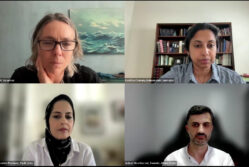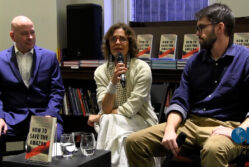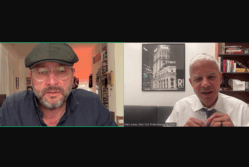Event Coverage Highlight

Afghan Journalists Reflect on Media After Taliban Rule and Lack of International Attention
by Chad Bouchard
Three Afghan journalists working outside the country before or after the Taliban takeover last year told an OPC audience on Dec. 13 that they are still fighting to tell stories of hope and despair about Afghanistan despite flagging interest from international media.
Deborah Amos, a governor of the OPC and a longtime reporter at National Public Radio covering the Middle East, served as moderator for the panel, which was focused on how Afghan journalists are reinventing themselves more than a year after the U.S. pulled troops out of the country.
“When the Taliban took over, there was a sudden collapse of so many achievements gained in the past 20 years,” said Zahra Nader, editor-in-chief of Zan Times, a media outlet that covers human rights in Afghanistan with a focus on women, the LGBT community and environmental issues. “Freedom of media, women’s rights, anything you can name – we felt August [2021] was the end of all of those.”
Nader worked with local media in Afghanistan in Kabul from 2011 to 2017, and then began working for The New York Times. After the return of Taliban rule last year, she and other displaced Afghans decided to establish Zan Times to help women journalists and marginalized groups still living under the new regime.
She said many women journalists, facing Taliban oppression from two fronts, have left Afghan newsrooms amid threats and as media organizations face the prohibitive costs and difficulty of maintaining gender segregation according to Taliban rules.
“Now what we’re seeing is that women journalists have been somehow erased from Afghanistan. They might be in their own houses, but they do not have the opportunity to work, to continue to grab that identity that they’ve had for so long,” she said. “At the same time, they lost the ability to put food on the table, to be an independent person, to support their families, as well as not having any opportunity, any hope for the future, any purpose to live for.”
Summia Tora is Afghanistan’s first Rhodes Scholar and a fellow at New America. She lauded the work of Zan Times and others looking for alternative voices that haven’t been heard. Tora said over the 20 years of media freedom during U.S. intervention, there was an emphasis in international media “in terms of progress and not so much a focus on the failures.”
“I think it’s important to not just focus on Afghan political elites, who are abroad now, and elevate their voices, but also looking to people on the ground who are living on a daily basis the realities of what the Taliban is doing.”
Tora is a member of an Afghan podcast team that produced “No Way Home,” a production for The Intercept.
Samiullah Mahdi is a former Radio Free Europe/Radio Liberty correspondent who co-founded Amu TV, a digital news platform that gathers journalists from within and outside Afghanistan to provide independent reporting in Farsi and Pashto.
He said that unfortunately, “Western media follows the Western military in our parts of the world.” Mahdi said international coverage of the collapse of Kabul in 2021 focused almost exclusively on the city’s airport. “It was as if the rest of the country didn’t exist,” he added.
“And Taliban were killing people at that time in so many parts of the country. Including in Kandahar, where they killed more than 1000 people in one district in less than a month. Nobody covered that,” he said. “Of course there were thousands of civilians who wanted to be evacuated by international troops, mainly by Americans. But there was another reason for the interest [in the airport evacuation]. There were American soldiers there. And when they left, international media left as well.”
Amos concluded the program by asking each panelist to discuss under-covered stories in Afghanistan that they wish international editors would assign.
Nader said she would ask for reporting on the country’s lack of protection for women.
“There is no legal system to support women in Afghanistan. There are no agencies tracking domestic violence or gender-based violence,” she said. Under the Taliban, men have been put in charge of women legally, so that husbands and fathers are held responsible for women who break rules about face coverings outside the home, for example. “They took agency from women to resist the Taliban. How do 20 million [women] live in a society where they don’t have rights, where there is no legal system in place to protect them?”
Tora said she wants to see more explanatory reporting on ethnic tensions and diversity that exist in Afghanistan.
“There’s a lack of acknowledgement on that when it comes to international media’s approach,” she said. “It’s very important that we talk about it and that we don’t look at Afghanistan as this united-front country, or a homogenous body.”
Tora added that media should listen to and employ journalists who are on the ground in their own communities, because it takes time and trust for Afghans to be fully willing to share their stories.
Mahdi suggested two key stories he would like to see covered.
“How is international aid being spent by the Taliban? Nobody is covering that,” he said. “How is that spent? And how do we know that money is not being used to suppress women, to suppress minorities, to help and support their terrorist affiliates?”
Madhi also said international media should keep an eye on the emergence and reemergence of terror groups with global agendas,= and should challenge claims by the Taliban that it will be a new ally in the so-called war against terror.
Click the window below to watch a playlist of clips from the program.



